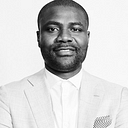The Future of Everything Festival: Unveiling the Impact of AI and Beyond
A Brief Dive into AI’s Disruption Across Industries and the Need for a Global Dialogue
Artificial Intelligence (AI) is undeniably reshaping every industry. I attended this year’s Future of Everything Festival, hosted by The Wall Street Journal, the event gathered industry experts, executives, and thought leaders to delve into these transformative trends. The festival featured discussions spanning business, technology, economics, finance, government, science, sports, style, and entertainment.
A significant focus was on AI’s disruptive effects on regulation, copyright protections, safety concerns, and antitrust issues. Notably absent, however, was a discussion on the global impact of AI, particularly Africa’s contributions and influence.
Key Insights from the Festival Panels
Lina Khan, Chair of the Federal Trade Commission, led a compelling discussion on “The Future of Antitrust.” She highlighted the devaluation of creativity and intellectual property due to AI, warning that “the web will become more closed than open.” Khan called for increased competition in the AI landscape to counter the dominance of major tech companies. She criticized non-compete clauses for stifling innovation, stating, “We’re losing out on innovation because of it.” Khan emphasized the FTC’s role in enforcing consumer protection and antitrust laws, expressing concern over AI’s potential to lift intellectual property without permission or compensation.
Keily Blair, CEO of OnlyFans, spoke on “The Future of the Creator Economy.” Blair emphasized that OnlyFans is “not advertiser-driven; we are creator-driven,” highlighting the platform’s substantial financial impact, having paid out over $5 billion to creators. She stressed the importance of safety, stating, “You shouldn’t retrofit safety. Safety by design rather than safety by afterthought.” Blair urged that AI focus on content scraping, attribution, and copyright infringement, positioning it as a tool to enhance creativity.
Laura Chambers, CEO of Mozilla, discussed “The Future of the Web.” She underscored Mozilla’s commitment to privacy, stating, “We will not default to an LLM AI. The browsing experience will allow users to determine their experience based on their ethics.” Chambers compared AI to the automobile, emphasizing the need for robust infrastructure to support its growth.
In “The Future of Music” panel, industry titans Tommy Mottola and Gloria Estefan discussed the explosive growth of Latin music and the potential challenges ahead. Mottola expressed skepticism about AI-generated music, arguing that it “doesn’t feel right.” He criticized private equity ownership of intellectual property but acknowledged, “business is business.” Estefan highlighted the financial pressures faced by artists today, noting, “Some artists need the money.”
Jonathan Haidt, in his session “The Future of Teens and Tech,” examined the impact of smartphones on Generation Z’s mental health and innovation. Haidt observed, “There’s a lot less innovation by Gen Z because young people have given all their attention to their phones.” He controversially stated, “OnlyFans is the only ethical social media company,” pointing to the platform’s unique business model as a potential solution to issues plaguing other social media platforms. Haidt details much of his thesis in his book ‘The Anxious Generation’, attributing teenage anxiety to social media as causation rather than correlation.
Ray Dalio, during “The Future of Finance” panel, addressed macroeconomic concerns such as the growth of debt, political conflicts, and the rise of power conflicts against the U.S. Dalio advised, “Consider the purpose of money and then hedge or immunize yourself to ensure that you will be good to leverage money for those things.” He highlighted the five most significant societal concerns: growth of debt, political conflict, rise of power conflicts, acts of nature (climate), and technology. Dalio recommended looking into 15 uncorrelated investments, emphasizing that correlation is determined by the pricing of an asset class and that the assets are affected by the following four quadrants.
Jason Kilar, former CEO of WarnerMedia, discussed “The Future of Media,” focusing on the impact of debt on innovation. Kilar stated, “Debt prevents you from focusing on the future,” given how leveraged tech companies and other businesses are. He highlighted the significance of user-generated content and predicted continued growth in this space, particularly in sports. Kilar emphasized that AI is merely a tool, remarking, “You will not be replaced by AI; you will be replaced by someone who knows how to use AI.”
Jeremy Zimmer, CEO of United Talent Agency, spoke on “The Future of Entertainment,” acknowledging the cyclical nature of talent popularity. Zimmer emphasized the enduring importance of human creativity despite the growing role of AI, noting, “Certain talent will not always connect with audiences at certain times in their career.”
Tade Oyerinde, Chancellor of Campus, addressed “The Future of College,” focusing on leveling the playing field for community college students. Oyerinde highlighted the need for education in developing skilled labor, stating, “We can only grow our way out of debt by educating our citizens.”
Conclusion
The Future of Everything Festival provided a comprehensive exploration of how AI and other technological innovations are reshaping our world. However, it also underscored the need for a more inclusive global dialogue, particularly regarding Africa’s role in this transformative era. As we navigate this rapidly changing landscape, it is imperative to consider diverse perspectives and foster environments that support innovation and investment worldwide.
Abiola Oke is the Founder and Principal at Adisa Consulting, a strategic business advisory firm serving clients at the intersection of media, entertainment and technology.
